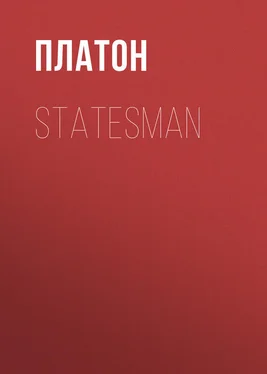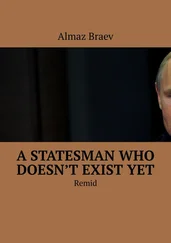Платон - Statesman
Здесь есть возможность читать онлайн «Платон - Statesman» — ознакомительный отрывок электронной книги совершенно бесплатно, а после прочтения отрывка купить полную версию. В некоторых случаях можно слушать аудио, скачать через торрент в формате fb2 и присутствует краткое содержание. Жанр: Философия, foreign_antique, foreign_prose, на английском языке. Описание произведения, (предисловие) а так же отзывы посетителей доступны на портале библиотеки ЛибКат.
- Название:Statesman
- Автор:
- Жанр:
- Год:неизвестен
- ISBN:нет данных
- Рейтинг книги:5 / 5. Голосов: 1
-
Избранное:Добавить в избранное
- Отзывы:
-
Ваша оценка:
- 100
- 1
- 2
- 3
- 4
- 5
Statesman: краткое содержание, описание и аннотация
Предлагаем к чтению аннотацию, описание, краткое содержание или предисловие (зависит от того, что написал сам автор книги «Statesman»). Если вы не нашли необходимую информацию о книге — напишите в комментариях, мы постараемся отыскать её.
Statesman — читать онлайн ознакомительный отрывок
Ниже представлен текст книги, разбитый по страницам. Система сохранения места последней прочитанной страницы, позволяет с удобством читать онлайн бесплатно книгу «Statesman», без необходимости каждый раз заново искать на чём Вы остановились. Поставьте закладку, и сможете в любой момент перейти на страницу, на которой закончили чтение.
Интервал:
Закладка:
And who are these who next come into view in various forms of men and animals and other monsters appearing – lions and centaurs and satyrs – who are these? I did not know them at first, for every one looks strange when he is unexpected. But now I recognize the politician and his troop, the chief of Sophists, the prince of charlatans, the most accomplished of wizards, who must be carefully distinguished from the true king or statesman. And here I will interpose a question: What are the true forms of government? Are they not three – monarchy, oligarchy, and democracy? and the distinctions of freedom and compulsion, law and no law, poverty and riches expand these three into six. Monarchy may be divided into royalty and tyranny; oligarchy into aristocracy and plutocracy; and democracy may observe the law or may not observe it. But are any of these governments worthy of the name? Is not government a science, and are we to suppose that scientific government is secured by the rulers being many or few, rich or poor, or by the rule being compulsory or voluntary? Can the many attain to science? In no Hellenic city are there fifty good draught players, and certainly there are not as many kings, for by kings we mean all those who are possessed of the political science. A true government must therefore be the government of one, or of a few. And they may govern us either with or without law, and whether they are poor or rich, and however they govern, provided they govern on some scientific principle, – it makes no difference. And as the physician may cure us with our will, or against our will, and by any mode of treatment, burning, bleeding, lowering, fattening, if he only proceeds scientifically: so the true governor may reduce or fatten or bleed the body corporate, while he acts according to the rules of his art, and with a view to the good of the state, whether according to law or without law.
'I do not like the notion, that there can be good government without law.'
I must explain: Law-making certainly is the business of a king; and yet the best thing of all is, not that the law should rule, but that the king should rule, for the varieties of circumstances are endless, and no simple or universal rule can suit them all, or last for ever. The law is just an ignorant brute of a tyrant, who insists always on his commands being fulfilled under all circumstances. 'Then why have we laws at all?' I will answer that question by asking you whether the training master gives a different discipline to each of his pupils, or whether he has a general rule of diet and exercise which is suited to the constitutions of the majority? 'The latter.' The legislator, too, is obliged to lay down general laws, and cannot enact what is precisely suitable to each particular case. He cannot be sitting at every man's side all his life, and prescribe for him the minute particulars of his duty, and therefore he is compelled to impose on himself and others the restriction of a written law. Let me suppose now, that a physician or trainer, having left directions for his patients or pupils, goes into a far country, and comes back sooner than he intended; owing to some unexpected change in the weather, the patient or pupil seems to require a different mode of treatment: Would he persist in his old commands, under the idea that all others are noxious and heterodox? Viewed in the light of science, would not the continuance of such regulations be ridiculous? And if the legislator, or another like him, comes back from a far country, is he to be prohibited from altering his own laws? The common people say: Let a man persuade the city first, and then let him impose new laws. But is a physician only to cure his patients by persuasion, and not by force? Is he a worse physician who uses a little gentle violence in effecting the cure? Or shall we say, that the violence is just, if exercised by a rich man, and unjust, if by a poor man? May not any man, rich or poor, with or without law, and whether the citizens like or not, do what is for their good? The pilot saves the lives of the crew, not by laying down rules, but by making his art a law, and, like him, the true governor has a strength of art which is superior to the law. This is scientific government, and all others are imitations only. Yet no great number of persons can attain to this science. And hence follows an important result. The true political principle is to assert the inviolability of the law, which, though not the best thing possible, is best for the imperfect condition of man.
I will explain my meaning by an illustration: – Suppose that mankind, indignant at the rogueries and caprices of physicians and pilots, call together an assembly, in which all who like may speak, the skilled as well as the unskilled, and that in their assembly they make decrees for regulating the practice of navigation and medicine which are to be binding on these professions for all time. Suppose that they elect annually by vote or lot those to whom authority in either department is to be delegated. And let us further imagine, that when the term of their magistracy has expired, the magistrates appointed by them are summoned before an ignorant and unprofessional court, and may be condemned and punished for breaking the regulations. They even go a step further, and enact, that he who is found enquiring into the truth of navigation and medicine, and is seeking to be wise above what is written, shall be called not an artist, but a dreamer, a prating Sophist and a corruptor of youth; and if he try to persuade others to investigate those sciences in a manner contrary to the law, he shall be punished with the utmost severity. And like rules might be extended to any art or science. But what would be the consequence?
'The arts would utterly perish, and human life, which is bad enough already, would become intolerable.'
But suppose, once more, that we were to appoint some one as the guardian of the law, who was both ignorant and interested, and who perverted the law: would not this be a still worse evil than the other? 'Certainly.' For the laws are based on some experience and wisdom. Hence the wiser course is, that they should be observed, although this is not the best thing of all, but only the second best. And whoever, having skill, should try to improve them, would act in the spirit of the law-giver. But then, as we have seen, no great number of men, whether poor or rich, can be makers of laws. And so, the nearest approach to true government is, when men do nothing contrary to their own written laws and national customs. When the rich preserve their customs and maintain the law, this is called aristocracy, or if they neglect the law, oligarchy. When an individual rules according to law, whether by the help of science or opinion, this is called monarchy; and when he has royal science he is a king, whether he be so in fact or not; but when he rules in spite of law, and is blind with ignorance and passion, he is called a tyrant. These forms of government exist, because men despair of the true king ever appearing among them; if he were to appear, they would joyfully hand over to him the reins of government. But, as there is no natural ruler of the hive, they meet together and make laws. And do we wonder, when the foundation of politics is in the letter only, at the miseries of states? Ought we not rather to admire the strength of the political bond? For cities have endured the worst of evils time out of mind; many cities have been shipwrecked, and some are like ships foundering, because their pilots are absolutely ignorant of the science which they profess.
Let us next ask, which of these untrue forms of government is the least bad, and which of them is the worst? I said at the beginning, that each of the three forms of government, royalty, aristocracy, and democracy, might be divided into two, so that the whole number of them, including the best, will be seven. Under monarchy we have already distinguished royalty and tyranny; of oligarchy there were two kinds, aristocracy and plutocracy; and democracy may also be divided, for there is a democracy which observes, and a democracy which neglects, the laws. The government of one is the best and the worst – the government of a few is less bad and less good – the government of the many is the least bad and least good of them all, being the best of all lawless governments, and the worst of all lawful ones. But the rulers of all these states, unless they have knowledge, are maintainers of idols, and themselves idols – wizards, and also Sophists; for, after many windings, the term 'Sophist' comes home to them.
Читать дальшеИнтервал:
Закладка:
Похожие книги на «Statesman»
Представляем Вашему вниманию похожие книги на «Statesman» списком для выбора. Мы отобрали схожую по названию и смыслу литературу в надежде предоставить читателям больше вариантов отыскать новые, интересные, ещё непрочитанные произведения.
Обсуждение, отзывы о книге «Statesman» и просто собственные мнения читателей. Оставьте ваши комментарии, напишите, что Вы думаете о произведении, его смысле или главных героях. Укажите что конкретно понравилось, а что нет, и почему Вы так считаете.










